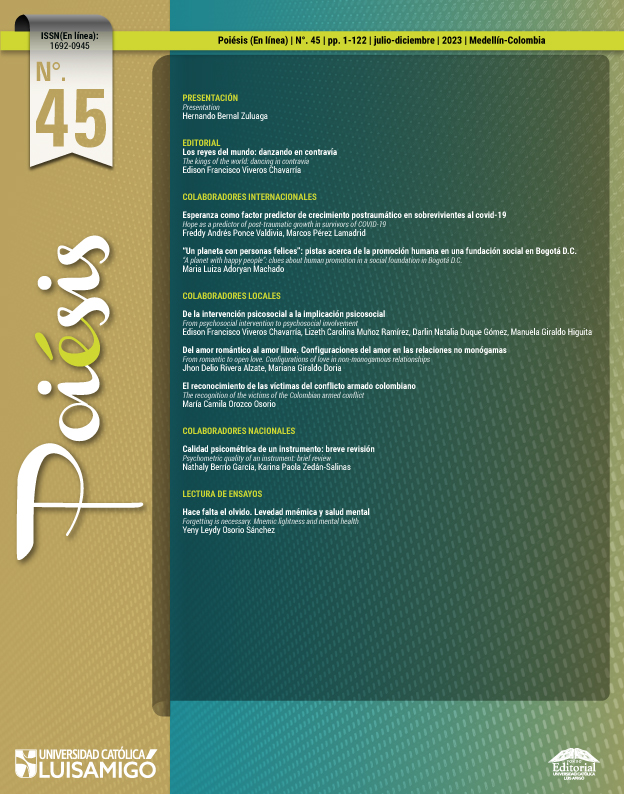Psychometric quality of an instrument: brief review
DOI:
https://doi.org/10.21501/16920945.4522Keywords:
Evaluation methods, Measurement, Psychometrics, Psychological testsAbstract
The objective of this review is to review the technical characteristics and psychometric properties that psychological instruments must have, for their safe and ethical use. The psychometric properties of the items of a test include six aspects that must be measured adequately and in their entirety so that the evaluation of technical quality is complete: difficulty and discrimination of the items, evidence of validity and reliability, homogeneity of the items, analysis of distractors and differential functioning of the items. We concluded that the technical quality of a test must be related to its choice by psychologists, and that it is an ethical decision of those who have the responsibility to carry out an objective and consistent follow-up based on evidence, regardless of the field. job in which they work.
Downloads
References
American Educational Research Association, American Psychological Association y National Council on Measurement in Education. (2014). Estándares para Pruebas Educativas y Psicológicas. American Educational Research Association. https://www.testingstandards.net/uploads/7/6/6/4/76643089/9780935302745_web.pdf
Anastasi A. y Urbina, S. (1998). Tests psicológicos. Pearson Educación.
Cohen R. y Swerdlik, M. (2001). Pruebas y evaluación psicológica: introducción a las pruebas y a la medición (J. A. Vásquez Arellano, Trad.). Editorial McGraw Hill.
Consejo General de la Psicología de España. (s.f.). Comisión de Test. https://www.cop.es/index.php?page=principios-eticos
Escobedo Portillo, M. T., Hernández Gómez, J. A., Estebané Ortega, V. y Martínez Moreno, G. (2016). Modelos de ecuaciones estructurales: Características, fases, construcción, aplicación y resultados. Ciencia & Trabajo, 18(55), 16-22. https://doi.org/10.4067/S0718-24492016000100004
García-Portilla, M., Bascarán, M., Sáiz, P., Bobes, M., Bousoño, M. y Bobes, J. (2022). Banco de instrumentos básicos para la práctica de la psiquiatría clínica. Editorial Universidad de Oviedo.
Gómez Mejías, A. E., Cerrada Valero, R. y Rangel Vasquez, R. E. (2018). Validez del material educativo de un programa de educación ambiental- sanitario no formal. Educere, 22(71), 131-152. https://www.redalyc.org/articulo.oa?id=35656002011
Hogan, T. P. (2015). Pruebas psicológicas: una introducción práctica. El Manual Moderno.
Lloret-Segura, S., Ferreres-Traver, A., Hernández-Baeza, A. y Tomás-Marco, I. (2014). El Análisis Factorial Exploratorio de los Ítems: Una guía práctica, revisada y actualizada. Anales de Psicología, 30(3), 1151-1169. https://doi.org/10.6018/analesps.30.3.199361
Meneses, J., Barrios, M., Bonillo, A., Cosculluela, A., Lozano, L.M., Turbany, J. y Valero, S. (2003). Psicometría. Editorial UOC.
Nuván Hurtado, I. L., Rivera Porras, D. A., Carrillo Sierra, S. M., Forgiony Santos, J. O., Bonilla Cruz, N. J. y Rozo Sánchez, A. C. (2018). Diferencias en la calidad psicométrica de test construidos mediante la estrategia pedagógica audiovisual y las estrategias pedagógicas tradicionales. Revista Espacios, 39(25). https://bonga.unisimon.edu.co/handle/20.500.12442/2310
Ocampo, L. (2003). Responsabilidad ética y profesional frente al uso de las pruebas psicométricas como herramientas de evaluación psicológica. Revista Universidad de San Buenaventura Medellín, 18, 147-149.
Romero, S. J. y Ordoñez, X. G. (2015). Psicometría. Ediciones Centro de Estudios Financieros Universidad a Distancia de Madrid.
Salas Vargas, A. A., Navarro Camacho, R. y Montero Rojas, E. (2017). Un modelo de ecuaciones estructurales para el estudio de factores que afectan la competencia lectora y la alfabetización matemática: Una aproximación bayesiana con datos de PISA 2009. Estadística Española, 59(194), 167-192. https://www.kerwa.ucr.ac.cr/handle/10669/82695
Viladrich, C., Angulo-Brunet, A., & Doval, E. (2017). Un viaje alrededor de alfa y omega para estimar la fiabilidad de consistencia interna. Anales de Psicología, 33(3), 755-782. https://doi.org/10.6018/analesps.33.3.268401
Published
How to Cite
Issue
Section
License

This work is licensed under a Creative Commons Attribution-NonCommercial-NoDerivatives 4.0 International License.
La revista y los textos individuales que en esta se divulgan están protegidos por las leyes de copyright y por los términos y condiciones de la Licencia Creative Commons Atribución-No Comercial- 4.0 Internacional. Permisos que vayan más allá de lo cubierto por esta licencia pueden encontrarse en http://www.funlam.edu.co/modules/fondoeditorial/ Derechos de autor.











